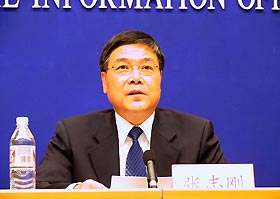|
Government announces 2,600 arrests for piracy
(Agencies)
Updated: 2005-06-28 23:54
China has arrested some 2,600 people in an eight-month-old crackdown on
product piracy, the government said Tuesday, criticizing U.S. complaints that it
is failing to stop rampant copying of foreign movies, music and other goods.
 |
| Vice Commerce Minister Zhang Zhigang briefs the media at
a press conference held by the Information Office of the State
Council, June 28, 2005.
[Xinhua] | Authorities have destroyed 63
million compact discs and other counterfeit goods estimated to be worth 860
million yuan ($105 million), said Vice Commerce Minister Zhang Zhigang, speaking
at a nationally televised news conference.
Zhang acknowledged that China still faces "quite a few problems," but he
criticized the United States for adding Beijing to a list of 14 countries that
receive special scrutiny due to widespread violation of copyrights and other
intellectual property rights.
"China has made great efforts to promote IPR protection," Zhang said. "Under
such circumstances, to accuse China of misconduct or lack of protection of IPR
is unreasonable."
The U.S. government said in April that product piracy in China had reached
"epidemic levels" and has warned that Beijing could face formal complaints in
the World Trade Organization, raising the threat of trade sanctions.
Authorities have brought 600 criminal cases against product pirates since the
crackdown began in August, and have won convictions in 99.9 percent of cases,
said Shen Deyong, the deputy chief judge of China's supreme court, who appeared
at the news conference with Zhang.
Shen didn't say how many people were convicted or what penalties they
received.
But China has begun imposing jail time for violations after its trading
partners complained that earlier penalties limited only to fines were too light
to deter pirates.
"China is among the countries that are meting out the most severe punishment
for IPR crimes," Shen said.
Zhang said 41 local officials also were punished for helping product pirates,
and that Chinese authorities have dismantled 24 illegal compact disc factories —
a key demand of U.S. officials, who complained that seizing pirated discs made
little sense if the factories that made them were still operating.
The crackdown was due to end in August, but Beijing now plans to extend it
through the end of the year, Zhang said.
"We'll be looking for a solution to address the root cause of the IPR
problem, and have increased our public education efforts," he said. "But still
there are quite a few problems."
|